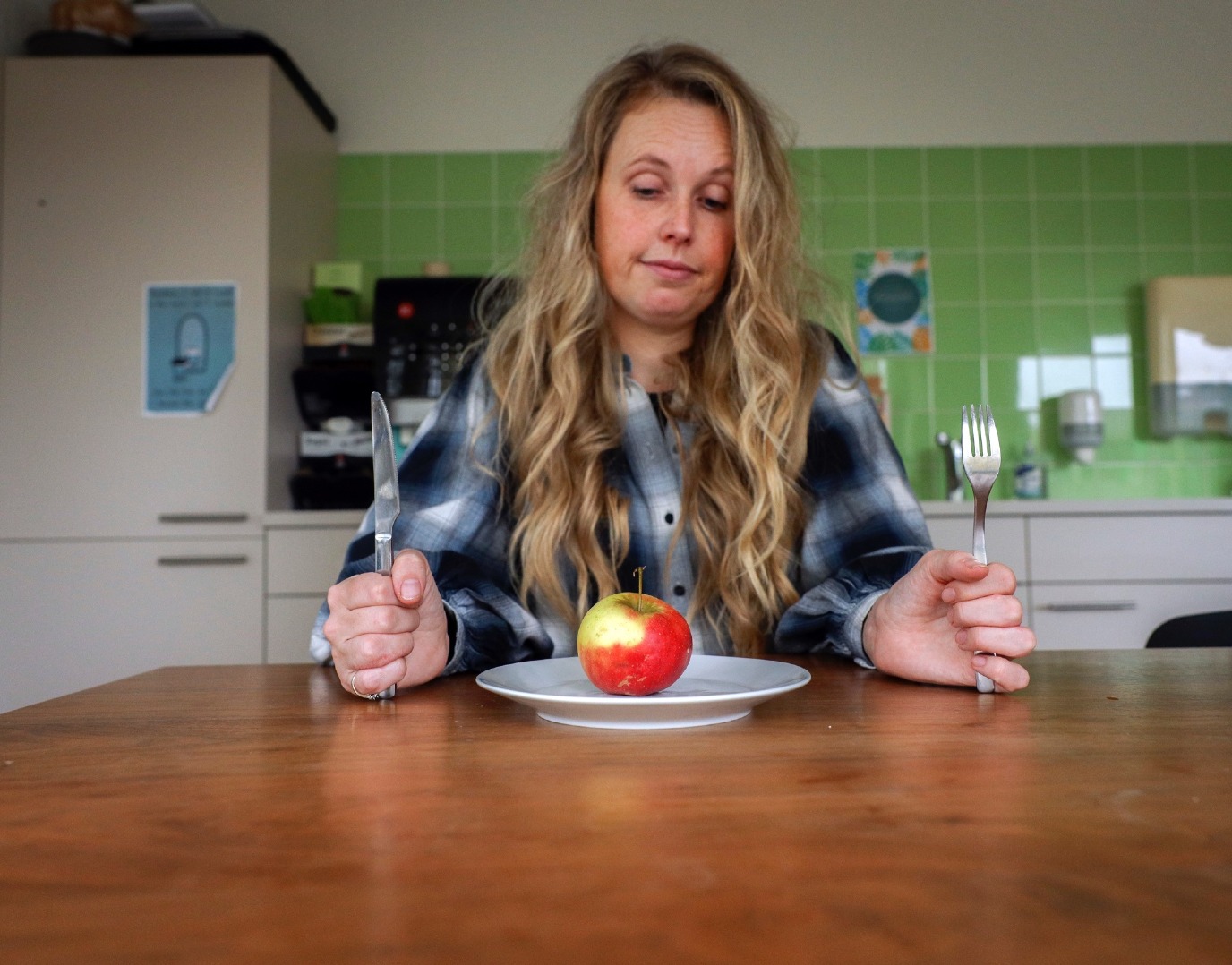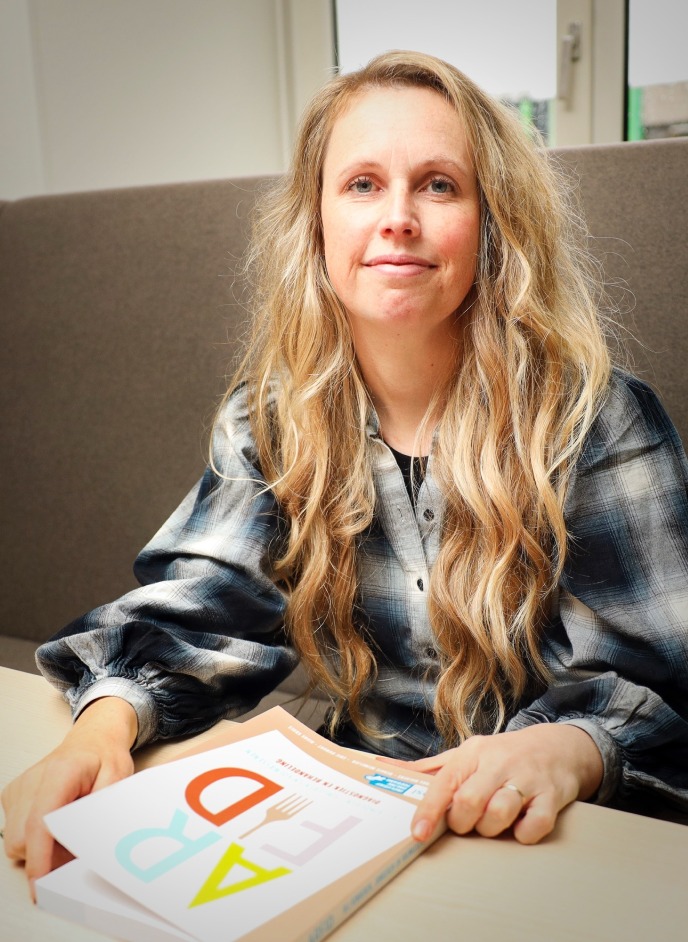De angst om te eten

Bij een eetstoornis denk je al gauw aan extreem afvallen of juist aan overgewicht. Er zijn echter vele vormen van eetstoornissen met vaak heel verschillende uitingsvormen en oorzaken. Renate Neimeijer doet onderzoek naar eetstoornissen bij kinderen en jongeren. Ze is als onderzoeker en docent verbonden aan de RUG en werkt als klinisch psycholoog in de praktijk bij Accare. Ze behandelt daar jongeren met anorexia en andere eetstoornissen. Haar lopende onderzoek richt zich op de vermijdende en restrictieve voedselinname-stoornis ARFID.
Tekst: Jaap Ploeger, Corporate Communicatie / Foto’s Henk Veenstra
Uithongering
Neimeijer deed aan de RUG onder andere onderzoek naar dysfunctionele informatieverwerkingsprocessen bij eetstoornissen. Ze heeft haar promotieonderzoek naar verstoorde informatieverwerking bij anorexia gedaan. Ze vertelt: ‘Ik deed onderzoek naar het verschijnsel dat jongeren met anorexia het zo lang kunnen volhouden om zichzelf uit te hongeren. Ik vroeg mij af hoe dat kon. Het is natuurlijk een extreme vorm van diëten om een bepaald lichaamsideaal te bereiken. Wat we bij een gemiddeld dieet zien is dat mensen na een paar weken of maanden stoppen, ofwel omdat ze het niet volhouden, of omdat het doel is bereikt. Bij meiden met anorexia nervosa werkt het blijkbaar anders en ik wilde snappen waarom.’

Onbewuste vermijdingsdrang
Uit haar onderzoek bleek dat deze jonge vrouwen (95% van de patiënten met anorexia is vrouw) op een onbewust niveau reageerden op eten of plaatjes van eten. ‘Wanneer jij of ik honger hebben en we lopen door een winkelstraat, gaat onze aandacht uit naar restaurants, snackbars en plaatjes van eten. Bij die meiden zagen we dat ze plaatjes van eten als bedreigend ervaren. Onbewust, naast de bewuste wens om af te vallen, kan dit helpen om het lijngedrag vol te houden.’ Bovendien kunnen ze door het ondergewicht en daarbij horende klachten steeds moeilijker goede keuzes maken. Dat sneeuwbaleffect zorgt er ook voor dat ze niet kunnen stoppen met hun extreme gedrag. Met cognitieve gedragstherapie is het grootste deel van de patiënten goed geholpen.
ARFID
Eetstoornissen kennen verschillende oorzaken. Soms is er geen duidelijke oorzaak of aanleiding aan te wijzen. Maar ook ziet Neimeijer soms een onveilige sociale omgeving waarbij pestgedrag voorkomt met lichaamsontevredenheid tot gevolg, een trauma of een andere negatieve associatie met eten. Haar huidige onderzoek richt zich op een relatief nieuwe eetstoornis: ARFID. Dit staat voor avoidant/restrictive food intake disorder oftewel vermijdende en restrictieve voedselinnamestoornis. Ze legt uit: ‘Met ARFID is een classificatie in het leven geroepen waarbij behandelaren een betere grip krijgen op ernstige eetproblemen die op verschillende manieren kunnen ontstaan. Zo kan een kind bijvoorbeeld sensorisch overgevoelig zijn, waardoor het moeilijk bepaalde voeding van een bepaalde smaak of structuur kan kauwen of doorslikken. Een kind kan angstig zijn omdat het zich een keer ernstig heeft verslikt in een bepaald product. Ook kan het zijn dat het kind helemaal niet goed aanvoelt of het honger heeft. Vaak ontstaat er dan veel gedoe rondom maaltijden in de thuissituatie. Eten krijgt dan meer en meer een negatieve associatie.’

Wanhopige ouders
We kennen allemaal uit onze eigen jeugd de spruitjes die niet gegeten worden, maar bij deze groep gaat het veel verder waardoor de gezondheid van het kind in gevaar kan komen. Wanneer een kind niet eet heeft dat grote gevolgen voor een gezin en het legt een zware druk bij de ouders. ‘Ik ken voorbeelden van ouders die zo wanhopig zijn en hun kind dan maar elke avond een witte boterham met hagelslag geven zodat het niet met honger naar bed gaat. Die gevallen komen uiteindelijk bij Accare terecht voor een intakegesprek,’ vertelt ze. Met haar onderzoek wil Neimeijer beter begrijpen wat de verschillende redenen zijn voor het ontwikkelen van ARFID en hoe huisartsen en zorgverleners het kunnen herkennen.
Behandelingen
Bij de behandeling van ARFID en elke andere eetstoornis is het belangrijk om de achterliggende reden van het gedrag te achterhalen en dat aan te passen naar gezond gedrag. Dat gebeurt vooral met cognitieve gedragstherapie, maar volgens Neimeijer is het ook belangrijk dat bij angst voor eten zoals bij ARFID het hele gezin betrokken wordt. ‘Als het elke avond een strijd is om je kind eten te geven willen we niet alleen het kind behandelen maar ook de ouders en broertjes of zusjes erbij betrekken. Het is belangrijk om bepaalde ingesleten patronen te doorbreken. Het eten van een maaltijd moet bij die gezinnen weer een fijn moment met elkaar worden en geen strijd.’
Gedachten kloppen niet
Kinderen die moeten spugen bij het eten van bepaalde voeding of die zich angstig voelen kunnen geholpen worden met exposure therapie. Door het nemen van kleine hapjes en het ontdekken van de structuur van een voedingsmiddel en daar mee bezig te zijn proberen therapeuten de angst weg te nemen. ‘We willen kinderen leren dat de gedachten die ze hebben over eten niet waar zijn,’ zegt Neimeijer. In een heel uitzonderlijk geval is het noodzakelijk dat kinderen via een slangetje eten toegediend krijgen omdat ze anders ernstige tekorten ontwikkelen en groeiproblemen krijgen. Deze sondevoeding is natuurlijk erg ingrijpend en wil je het liefst vermijden. Ze benadrukt dat bij het overgrote deel van de patiënten zij zelf of de ouders op tijd hulp zoeken en dat de stoornis goed te behandelen is.
10 jaar
Neimeijer heeft samen met collega-onderzoekers uit Maastricht net een boek gepubliceerd met behandelstrategieën bij ARFID. Met dit handboek kunnen behandelaars beter uit de voeten met de diagnostiek en behandeling van ARFID. ‘De diagnose bestaat nu ruim 10 jaar en er wordt steeds meer over bekend, wat de herkenning en behandeling steeds beter maakt. Mijn huidige onderzoek draagt daar hopelijk ook aan bij,’ besluit Neimeijer.
Meer informatie
Meer nieuws
-
17 februari 2026
Van ghostbuster tot rampenonderzoeker
-
03 februari 2026
‘Daar zit een goeie kop op’
-
20 januari 2026
Alcohol, appen en e-bikes
